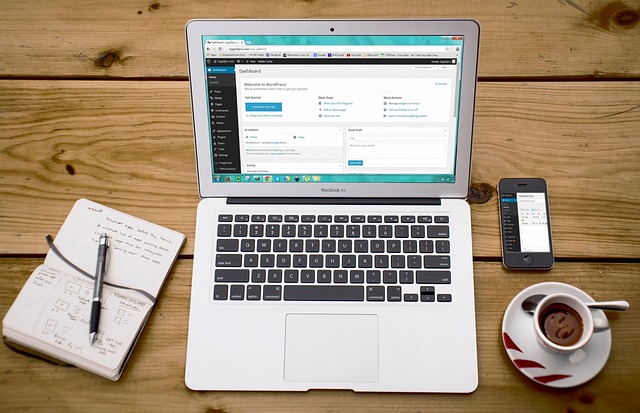Whether you are a freelance graphic designer or you own a physical store specializing in hardware, there is no denying that a great website is of essential importance for your business success.
Now, website design has evolved considerably and it’s fair to say that things got a lot easier over time. Nowadays, you don’t need to learn how to code if you need an online presence.
However, the competition today is fiercer than ever, which means that you should take valuable advice before you start a small business website. Keep reading to learn about six important tips that will set you on a path to success with your new business website.
Get the domain name right!

If you look at your business website as the most important part of your company’s online identity, then the website name is definitely one of the first things visitors will see. Naturally, that makes the domain name quite an important part of the website and this company’s identity.
Try to be descriptive when figuring out the name, but also keep it short and simple. It’s important that visitors remember the name easily.
Avoid numbers and hyphens since they are difficult to remember and they are most certainly less elegant and memorable than word-only domain names.
Finally, also use a proper extension. Aim at a .com domain extension unless it’s more appropriate to use another extension such as .gov or .edu.
Buy a secure and reliable website hosting

A website host (website hosting provider) offers a ‘home’ to your website online. In other words, this is a company that offers the technology and services needed for a website to be up online.
These services can cost anywhere between $2 to $100 and more per month, depending on the kind of technology and support you choose. If you buy a yearly plan, you can get a discount in most cases.
Make sure that your plan is a reliable one. Many users nowadays go for VPS hosting plans (virtual private servers) that are not too expensive but still offer great features.
The cost ranges from around $20 to $50 per month, which is quite affordable. And, since it’s a private server, you get the benefit of not sharing it with anyone. It’s the best of both worlds, really.
Use the appropriate CMS…

A content management system (CMS) is a software program or application that is used to create and manage digital content. It helps with website maintenance, and you don’t have to possess a lot of technical knowledge to use some of them.
However, choosing a CMS that is a good fit for your specific needs should be a priority. One of the most popular systems of this kind is, without a doubt, WordPress. WordPress has a vast, active support community and many useful plugins to extend the functionality of your website.
Its plugins cover a platter of different things. There are plugins that enhance features of a website, those that deal with security, and you can even find a great WordPress FAQ plugin if you have customers that are curious to find out more about your business and industry.
WordPress is also free and quite simple to install. Most web developers are familiar with it, so it’s not difficult to find a person or an agency that can work on your website.
… Or pick the right eCommerce platform

Since you are most likely trying to sell products from your new website, it’s quite important to pick the right eCommerce platform that will suit your needs in the best possible way.
A lot of users go for the WooCommerce platform since it turns a WordPress website into an online store perfectly.
Exactly like WordPress, this platform offers quite a lot of plugins, plus it works great with WordPress. However, bear in mind that you will need a WordPress developer to set things up if you are not tech-savvy.
Finally, WooCommerce offers a very high amount of capabilities and scalability that your small business will need in the days to come.
Other choices that are worth considering include:
- Shopify
- GoDaddy Online Store
- Business Squarespace
Start thinking about marketing

It’s fair to say that you shouldn’t focus too much on marketing during the initial days. However, you should have a few things in mind.
- First of all, you should know that the content of your website needs to be of the top quality if you want success. This includes what you are saying about your products, how you are structuring text on your website, and what you publish on your company’s blog and social media channels.
- The content about your services or products has to be 100% accurate. It also has to provide some kind of value to your website visitors.
- On top of that, including social sharing buttons is a must. Social media platforms are essential if you want to sell successfully online.
- Having a blog is also one of the cornerstones of success. Your blog has to be full of unique posts that attract visitors’ attention and provide them with something of value.
For instance, if you are running a tech store, informing your audience of tech novelties through your blog should be something you do on a monthly basis, to say the least. Add some tutorials, guides, and reviews to easily grab people’s attention and drive even more traffic to your website.
- Think about online advertising. Ads can bring a lot of traffic to your website and they are perfect for early-stage businesses. And this brings us to landing pages.
- Landing pages are crucial for your ad campaigns. They need to be beautiful and simple to convert as many people as possible. To build a perfect landing page, you need to know the difference between landing pages vs. homepages, you need to know your audience well, and also have converting copy and design.
Once you master the basics such as the ones mentioned here, you can move on to setting up a proper marketing strategy.
Have a website maintenance plan

A lot of website owners don’t realize how important it is to maintain their websites once they set them up.
A website should never be created and then left to grow stale. In order to have a successful website that ranks well in search engines and doesn’t get hacked or ‘landed’, you need to ensure that it is properly maintained.
So, in order to keep things in order, you can do a few things for a start:
- Use traffic data to learn more about your audience so you can better cater to them.
- Always install all the updates.
- Run security scans to ensure that your website is clean of malware and that it hasn’t been hacked.
- Split test to see which of the various versions of your website helps performance.
- Ask website users to send you feedback about your website.
- Check your rivals’ websites every once in a while to see what they are doing with their online presence.
- Back up your website at least once a day and make sure it’s always backed up 10 days back.
Final thoughts
You may think that creating a small business website isn’t easy, especially after you have read this article. However, you should consider the tips listed above and help yourself start things off on the right foot.
Maximize the chances of success in any way you can. Good luck!

